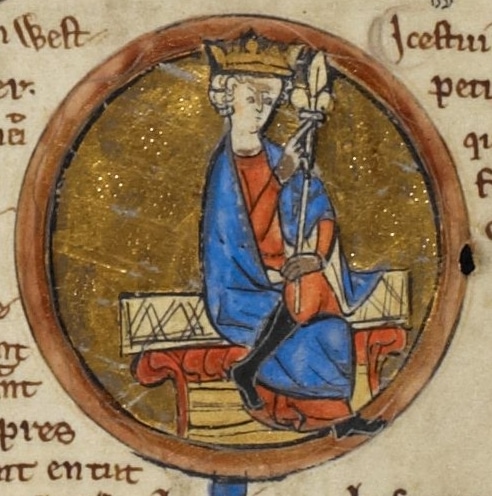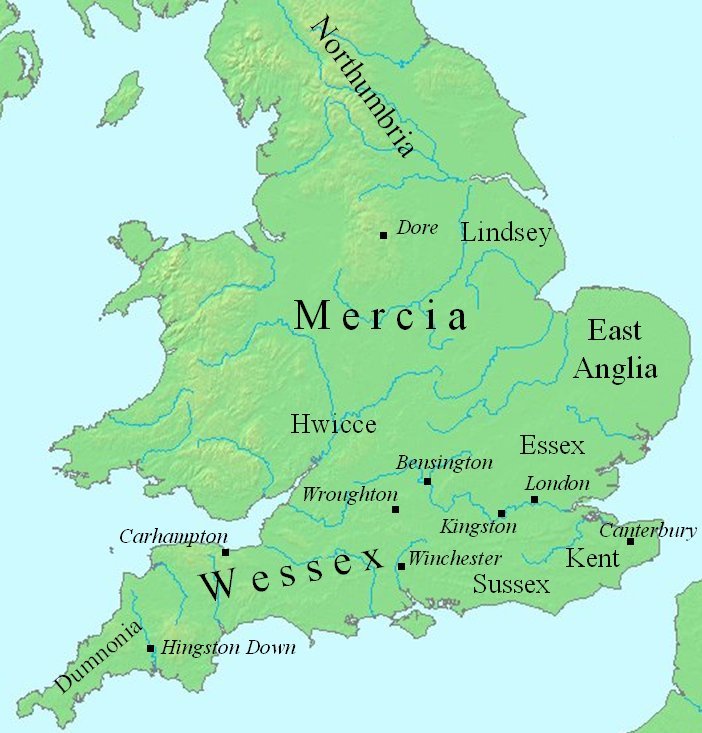King Egbert was the first King of England. He was the first man to establish a stable and extensive rule over the Anglo-Saxons of England.

He had been exiled at the court of Charlemagne in 802 but returned to England and ruled the kingdom of Wessex.
In 827, he conquered Mercia, which gave him control of all of England south of Humber. He continued his conquest with victories at Northumberland and North Wales.
At 70 years old, he defeated a combined force of Danes and Cornish at Hingston Down in Cornwall.
Jump to:
King Egbert Facts: Rise to Power
- There is not much known about Egbert's early years. It is believed that his father was Ealhmund, who wielded some power in Kent. However, the power was short-lived, and Egbert found himself on the outs with the dominant powers of the day: Offa of Mercia and King Cynewulf (ruler of Wessex)
- In 786, Cynewulf was murdered. Egbert tried to seize this vacuum of power but was defeated by Beorhtric with the help of Offa.
- Egbert was exiled by Beorhtric and Offa to Francia. During this time, Francia was ruled by Charlemagne, who maintained Frankish influence in Northumbria and is known to have supported Offa's enemies in the south.
- During his exile, Egbert learned the art of government and politics. He was able to secure a positive relationship with Charlemagne.
- In the year 802, the opportunity presented itself to take power in England. Offa had died two years prior to leaving Cenwulf in power, and Beorhtric died that year, leaving the throne of Wessex vacant. Egbert then seized the throne in Wessex with the support of Charlemagne and the papacy.
King Egbert Facts: Conquest

- The Mercians opposed his ascent to the throne and attacked him. He met and defeated them. This eliminated Wessex's dependency on Mercia.
- Cenwulf did have overlordship of the rest of southern England, but in Cenwulf's charters, the title of "overlord of the southern English" never appears, presumably in consequence of the independence of the kingdom of Wessex.
- In 815, King Egbert began to take control of other territories in the region. He won many victories, securing his power in southern England by 825.
- In 825, King Egbert won the Battle of Ellandun, one of the most significant battles in English History. This eliminated Mercia's power in the Southeastern region of England and made Mercia susceptible to an invasion.
- In 829, King Egbert invaded Mercia and drove Wiglaf, the king of Mercia, into exile. This victory gave Ecgberht control of the London Mint, and he issued coins as King of Mercia.
- In 830, King Egbert's influence waned, and Wiglaf rose to power in Mercia and took back their independence from Wessex rule.
- Despite the loss of dominance, Ecgberht's military successes fundamentally changed the political landscape of Anglo-Saxon England. Wessex retained control of the south-eastern kingdoms, with the possible exception of Essex, and Mercia did not regain control of East Anglia.
King Egbert Facts: Aftermath
- King Egbert's victories marked the end of the independent existence of the kingdoms of Kent and Sussex. The conquered territories were administered as a subkingdom for a while, including Surrey and possibly Essex.
- In 836, King Egbert was defeated at Carhampton by the Danes.
- In 838, he won a battle against them and their allies, the West Welsh, at the Battle of Hingston Down in Cornwall.
- At a council at Kingston upon the Thames in 838, Egbert and Aethelwulf granted land to the sees of Winchester and Canterbury in return for the promise of support for Aethelwulf's claim to the throne.
- This would set the stage for Egbert's line to rule after his death. Aethelwulf would become king and father Alfred the Great, who would further Egbert's work.
- King Egbert died in 839 and was buried in Winchester.
Conclusion
King Egbert's influence in English history cannot be doubted.
His reign would unite much of southern England and begin to tear down the power of Mercia. His work would be completed with his son Aethelwulf and grandson Alfred the Great.
